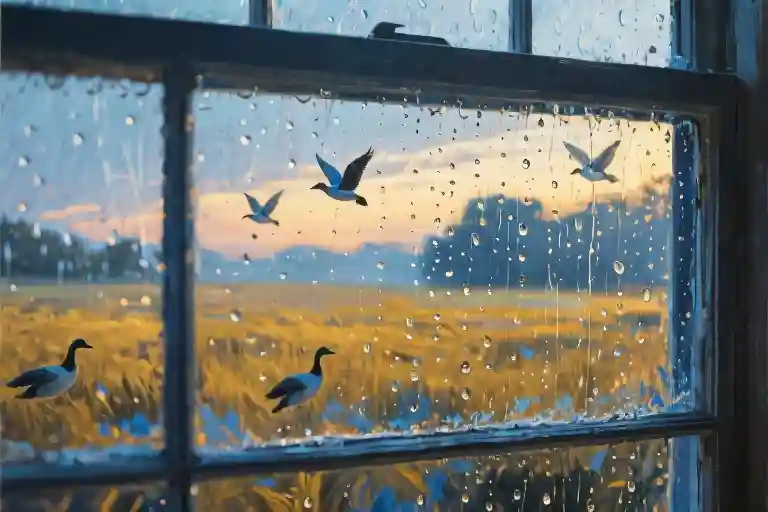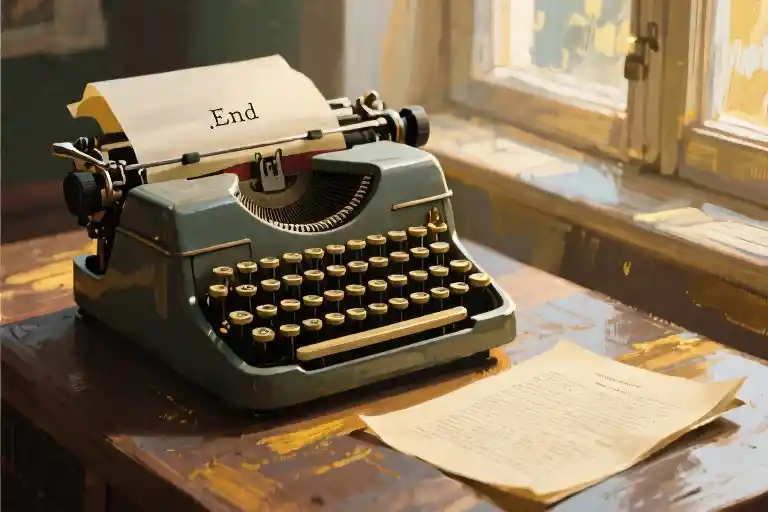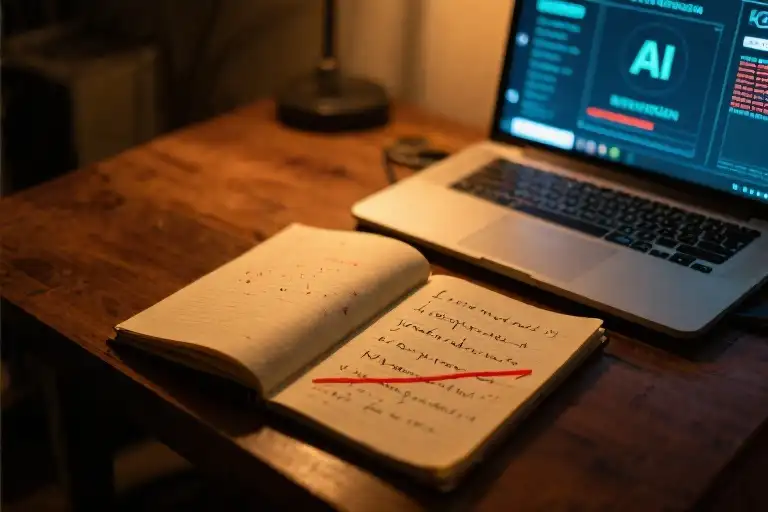The geese move in perfect formation across paintbrush fields, their wings slicing through air thick with the promise of rain. From my desk by the window, I trace their path with a finger against the glass, leaving smudged fingerprints that blur the boundary between observer and observed. Outside, the first drops begin their descent, each one distorting the view of ponds that have reflected generations of writers’ gazes.
Raindrops gather on the office door’s glass pane, merging into rivulets that mimic the lines on an aging face. The same condensation fogged prison windows where I once pressed my forehead against cold transparency, learning the cruel arithmetic of belonging: to see is not to touch, to witness is not to participate. The glass door becomes both canvas and cage, its surface holding the dual imprint of my breath and the world’s indifference.
What happens when observation becomes evidence of exile? When the act of seeing—those formations of geese, the painterly light on water—only confirms your status as permanent outsider? The question lingers like the metallic aftertaste of biting your own tongue. Beyond the glass, ducks explode upward from the marsh in a flurry of wings and droplets, their flight path spelling out words we’ve forgotten how to read.
The rain intensifies, its rhythm syncopating with the hum of fluorescent lights. Somewhere in this overlapping of natural and artificial, between the wild geese and the manufactured glow, exists the writer’s eternal dilemma: we are made of the stories we witness yet barred from claiming them as our own. The glass fogs completely now, erasing the outside world until all that remains is the ghost of my reflection—a face composed entirely of questions.
Through the warped transparency comes the scent of wet earth, that primal smell carrying memories of childhood puddles and adult regrets. The geese have disappeared into low clouds, leaving only their haunting cries that sound remarkably like pages turning. I close my eyes and the glass disappears beneath my fingertips, becoming what it has always been: not a barrier, but a membrane where life and literature osmose.
trauma writing begins here, in this liminal space between participation and observation. The existential loneliness of the creative life pulses beneath each raindrop’s impact. What we call literary healing might simply be the courage to keep our palms flat against the glass, transmitting warmth to the other side where fragmented narratives take flight like startled waterfowl, beautiful precisely because they cannot be fully possessed.
The Heart of a Transparent Cell
The geese cut across the sky in ragged V-formations, their wings dipping into pools of goldenrod and ochre—those paintbrush fields stretching beyond the glass. From my desk, I trace their flight paths with a fingertip against the windowpane, leaving smudges that catch the afternoon light. This is how writers steal time: by pressing moments between glass slides like fragile specimens.
Three years ago, I pressed my forehead to a different kind of glass. Prison windows don’t open, but they conduct cold with brutal efficiency. I learned to read the weather by how the steel frame wept condensation. Those hours of watching through double-paned barriers taught me something terrible: observation can be its own confinement. The more intently you study beauty, the more certain you become of your exclusion from it.
Try this experiment. Press your tongue to a window in winter. The initial shock of cold gives way to a dull burn, then numbness. That’s the progression of detachment—from sharp pain to absence of feeling. I’ve left fragments of myself on half a dozen glass surfaces: lipstick smears on airport terminals, breath fog on bookstore windows, the salt residue of tears wiped hastily on a sleeve. Each mark a failed attempt to bridge the transparent divide.
Rain begins its morse code against the office door. The droplets sketch temporary runes before gravity pulls them downward. Run, the glass seems to whisper in liquid cursive. A verb or a noun? An instruction or an observation? Through the warping water, the geese have become gray smudges moving eastward. Their freedom tastes like copper in my mouth—that familiar metallic tang of watching life happen at one remove.
What writers and prisoners share isn’t just the act of looking, but the certainty that the world on the other side of the glass has already judged us unworthy. The geese don’t care about my unspoken plea to take me with them. The rain keeps writing its ephemeral language. Somewhere beyond this pane, Henry coughs blood into an ambulance glove, but that’s another story for another pane of glass.
The Static Transmission of Love
(Stage lights flicker to life, illuminating a single folded towel center stage. The rest of the kitchen remains in shadows – a toaster’s outline here, the ghost of a refrigerator there. A man’s voice echoes from off-left:)
Father (muffled): These towels are new.
(A pause. The towel seems to glow brighter under the spotlight. From the darkness stage-right, a younger voice:)
Daughter (flat): How? When did you get them?
(Silence stretches like the fibers of the towel’s Egyptian cotton. When the reply comes, it carries the weight of unopened moving boxes:)
Father (softly): From home.
This is how we measure love in my family – by the bandwidth of what goes unsaid. That towel contained multitudes: the home we’d left three states behind, the way his hands hesitated before taking mine at graduation, the unasked question of whether daughters should teach fathers how to love them.
Men don’t come with manuals for raising girls. They love us through:
- The thermodynamics of reheated casseroles left at midnight on dorm room desks
- Weather reports texted to phones in different time zones
- Towels declared new because carrying them across state lines made them so
(Lights shift. A pair of eyeglasses materializes on the kitchen table, their lenses catching blue light from some unseen screen. The dialogue fractures into parallel streams:)
Mother (bright): We could not be more different!
I never wanted carbon copies, only fingerprints that matched somewhere.
Mother (laughing): You got your father’s stubbornness.
What if I wanted your collarbones instead? The way you held anger like a teacup?
(The ambulance light glows through the lenses now, casting medical blue across the towel’s terrycloth valleys. We’re remembering Henry – whoever he was – strapped to a gurney with his secrets. The sirens aren’t loud enough to drown out the question: When does borrowed love become your own?)
This is the frequency at which family signals travel – slightly out of phase, distorted by the atmosphere of years. We broadcast in codes:
- Material semaphore: A towel = I kept something you might recognize
- Genetic commentary: “We’re different” = I see myself failing in you
- Chronological distortion: “From home” = the place before time broke
(The spotlight narrows to a single thread protruding from the towel’s edge. It trembles like a EKG line. Somewhere, a washing machine hums the song of perpetual cycles. Blackout.)
The Folded Time
The ambulance straps tremble like live wires. Henry’s story isn’t told through wounds or sirens, but through the frayed edge of a trauma shears pouch vibrating against stainless steel—three inches of nylon webbing that holds more history than any confession could. In emergency vehicles, time doesn’t flow; it pools in the hollows of intubation trays and coagulates around discarded latex gloves.
ICU monitors know this secret. Their glowing numerals don’t count seconds—they measure the widening gap between respiration and existence. 82… 81… 80… each decrement a silent referendum on the lie of ‘making the most of time.’ The machine insists on continuity while the mind inhabits a parallel chronology where seven o’clock stretches into the brittle hours of a nonagenarian’s night.
Somewhere between Henry’s shuddering restraints and the cardiac monitor’s relentless arithmetic, we understand: trauma writes its own time zones. The body may occupy present tense, but consciousness drifts through warped temporal latitudes—sometimes lagging behind like an unbuffered video, other times racing ahead to pre-grieve losses still nesting in the future’s branches.
A shift occurs in the auditory landscape. The ambulance wail doesn’t fade—it transmutes. The oscillating Doppler effect becomes the rhythmic churn of a washing machine in another life, another timeline. Dad’s new towels (from home, always from home) rotate behind the porthole window, performing their endless purification ritual. Here in the folded time, even laundry becomes ceremonial—the closest some families come to healing rites.
Make the most of the time you’ve got assumes time is linear fabric waiting to be embroidered. But trauma survivors know better. Time is origami—a single sheet pleated until past, present and future occupy adjacent planes. The crease where Henry’s ambulance meets Dad’s washing machine isn’t a discontinuity; it’s the most honest map we have.
Rain taps against hospital glass with the same insistence it once used on prison windows. The droplets don’t care about our chronological pretenses. They’ll keep tracing their chaotic paths across barriers—medical, carceral, domestic—until we acknowledge the truth: survival isn’t measured in hours, but in the courage to inhabit time’s folds without going mad.
The Map of Unfinished Journeys
The washing machine hums its steady rhythm in the adjacent room, its vibrations traveling through the floorboards to where I stand by the glass door. Dad’s words echo in the space between mechanical rotations: “from home.” Two syllables holding generations of unspoken narratives—the worn edges of familial love, the stubborn stains of missed connections.
Through the kitchen doorway, I watch the towels tumble in hypnotic circles. Their cotton fibers absorb detergent and memory in equal measure—the one he claimed as new still bears the faintest scent of our old laundry room. That particular blend of fabric softener and damp concrete no one thinks to replicate until it’s gone. The machine pauses mid-cycle, as if considering whether to continue, then resumes with renewed determination.
Outside, the rain has stopped. Water droplets cling to the glass at irregular intervals, their slow descent tracing paths that never quite intersect. The patterns remind me of childhood road trips—Dad’s finger following highway routes on paper maps while I traced competing paths on my fogged window. Neither trajectory ever matched the actual journey.
A single drop hesitates at the base of the pane, catching the late afternoon light. For a suspended moment it holds everything: the geese we never saw together, the ambulance rides we never discussed, the years measured in folded linens rather than words. Then it falls, leaving behind the faintest residue of where it might have gone.
The glass door reflects the room now—my silhouette superimposed over the landscape beyond. Somewhere between the two surfaces exists that impossible distance we name “home,” always visible yet never quite within reach. The washing machine chimes its completion. I go to retrieve the towels, warm from their artificial journey, and begin the familiar work of folding.





